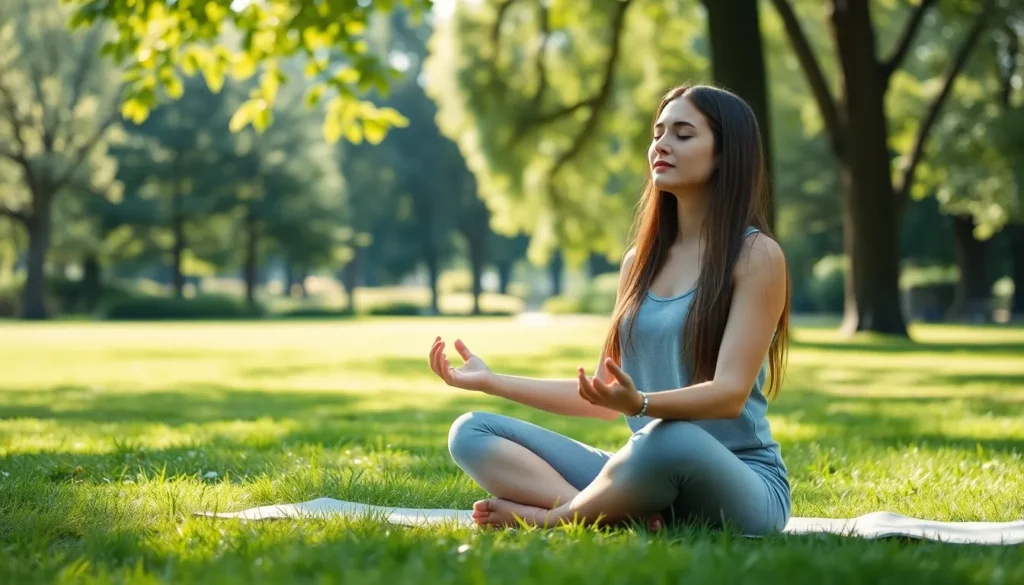Table of Contents
ToggleIn a world buzzing with distractions, mindfulness meditation offers a refreshing escape. Imagine sitting quietly while your thoughts race like a caffeinated squirrel. It sounds challenging, but that’s where the magic happens. By focusing on the present moment, mindfulness meditation helps calm the chaos and brings clarity to the mind.
Picture this: instead of stressing over that email you forgot to send or the laundry mountain waiting at home, you can tune into your breath and let the worries float away. It’s like hitting the reset button on your brain. With just a few minutes a day, anyone can unlock the benefits of mindfulness meditation, transforming anxiety into tranquility and stress into serenity. So why not give it a shot? Your mind will thank you—eventually.
What Is Mindfulness Meditation?
Mindfulness meditation involves the practice of focusing one’s awareness on the present moment. This technique encourages individuals to observe their thoughts, feelings, and bodily sensations without judgment. Participants typically engage in this meditation by concentrating on their breath or a particular object, which helps anchor their attention.
Studies show mindfulness meditation reduces stress and promotes emotional well-being. Participants often report greater feelings of calmness and clarity after regular practice. Integrating mindfulness into daily routines can enhance overall quality of life, fostering resilience against anxiety and fostering a sense of peace.
Various forms of mindfulness meditation exist, including guided sessions, group practices, and self-directed approaches. Each type caters to different preferences, allowing individuals to choose what aligns best with their needs. Many find that even short durations, such as five to ten minutes daily, yield significant improvements in mental state.
Research indicates consistent practitioners experience increased focus and improved cognitive functioning. Mindfulness meditation also cultivates self-awareness, enabling individuals to respond to stressors more effectively rather than reacting impulsively. Creating a dedicated space for meditation can further support the practice, making it a more enriching experience.
Mindfulness meditation equips individuals with tools to navigate life’s challenges. By returning to the present moment, they can release anxieties about the past or future. This practice isn’t merely a technique but rather a lifestyle change that encourages embracing each moment fully.
Benefits of Mindfulness Meditation

Mindfulness meditation offers numerous benefits that contribute to overall well-being. Mental and physical health improvements stand out as key advantages.
Mental Health Improvements
Research shows mindfulness meditation effectively reduces symptoms of anxiety and depression. Practitioners report a decrease in stress levels, leading to overall emotional stability. Enhanced focus and concentration arise from regular meditation sessions, allowing individuals to manage distractions better. Self-awareness increases as individuals learn to observe thoughts and feelings without judgment. These improvements foster resilience, enabling people to cope with life’s challenges more effectively.
Physical Health Benefits
Physical health enhances significantly through mindfulness meditation. Research indicates lower blood pressure levels among consistent practitioners, reducing the risk of heart-related issues. Improved immune function emerges as stress reduction contributes positively to overall health. Regular mindfulness practice promotes better sleep patterns, aiding in recovery and rejuvenation. Individuals often experience decreased chronic pain due to heightened awareness and acceptance of bodily sensations. Fostering these physical benefits leads to a healthier, more balanced lifestyle.
Techniques for Practicing Mindfulness Meditation
Mindfulness meditation encompasses various practices that can enhance focus and promote calmness.
Basic Mindfulness Meditation Practices
Breath awareness serves as a foundational practice. Observing the natural rhythm of breath encourages individuals to anchor thoughts in the present moment. Body scan meditation focuses attention sequentially on different body parts, fostering relaxation and awareness. Guided imagery offers visual scenarios, leading practitioners through tranquil landscapes or soothing experiences. Daily commitment to these basic methods, even for a few minutes, can yield significant improvements in mental clarity and emotional balance.
Advanced Techniques
Loving-kindness meditation extends compassion towards oneself and others. This practice nurtures emotional well-being, enhancing feelings of connection. Mindful walking integrates movement with awareness, allowing individuals to experience their surroundings fully. Practicing with meditation apps or attending workshops introduces diverse techniques and expertise. Deepening mindfulness through advanced methods fosters greater self-awareness and enables individuals to respond thoughtfully to life’s challenges. Consistent practice promotes overall well-being and resilience against stressors.
Common Challenges in Mindfulness Meditation
Practicing mindfulness meditation presents several challenges that individuals may encounter. Distractions often make it difficult to maintain focus during sessions. External noises or internal thoughts can disrupt the calming experience and lead to frustration.
Another common challenge involves dealing with racing thoughts. Individuals may find their minds wandering to past events or future anxieties. Accepting these thoughts without judgment supports a more effective meditation practice.
Time constraints frequently hinder regular practice. Busy schedules can make it challenging to find dedicated moments for meditation. Allocating even a few minutes each day can yield benefits, but commitment remains vital.
Physical discomfort often arises during meditation. Sitting for extended periods can lead to aches or restlessness. Adjusting posture or practicing on a comfortable cushion can help alleviate these physical distractions.
Emotional resistance might also pose a challenge. Some individuals may hesitate to confront thoughts or feelings that surface during meditation. Recognizing these emotions as part of the process fosters a deeper understanding of oneself.
Setting unrealistic expectations can create discouragement. Some practitioners anticipate immediate results, yet mindfulness requires patience and consistency. Accepting the journey of personal growth is essential for long-term success.
Feeling overwhelmed by the techniques can affect motivation. With various methods available, selecting the right one may feel daunting. Starting with simple techniques like breath awareness can ease individuals into the practice.
Each of these challenges can be addressed with persistence and a supportive mindset. Acknowledging difficulties fosters growth and acceptance within the mindfulness journey. By maintaining a commitment to regular practice, individuals may gradually overcome these obstacles.
Mindfulness meditation offers a powerful pathway to mental clarity and emotional well-being. By embracing the present moment individuals can cultivate a sense of calm that permeates their daily lives. The journey may come with challenges but with consistent practice the rewards are profound.
As practitioners develop their skills they often find themselves better equipped to handle stress and navigate life’s complexities. Whether through simple breath awareness or more advanced techniques mindfulness meditation can be tailored to fit anyone’s lifestyle.
With just a few minutes each day dedicated to this practice individuals can transform their mental landscape and enhance their overall quality of life. Embracing mindfulness is not just a practice but a commitment to living fully in each moment.







